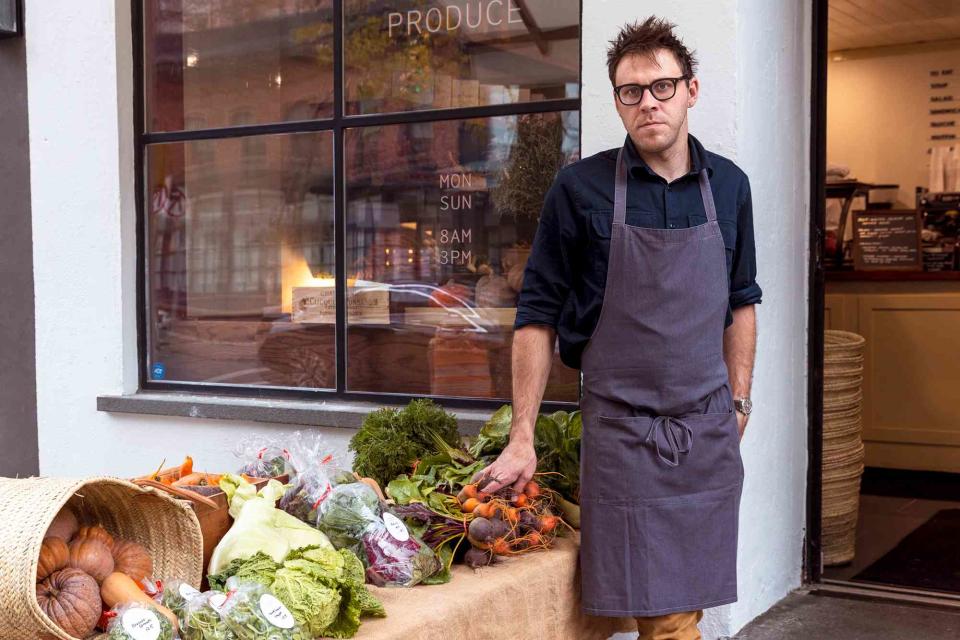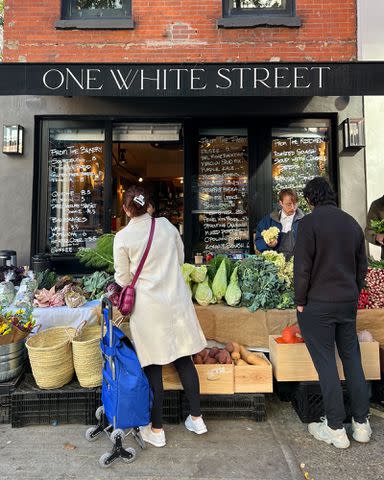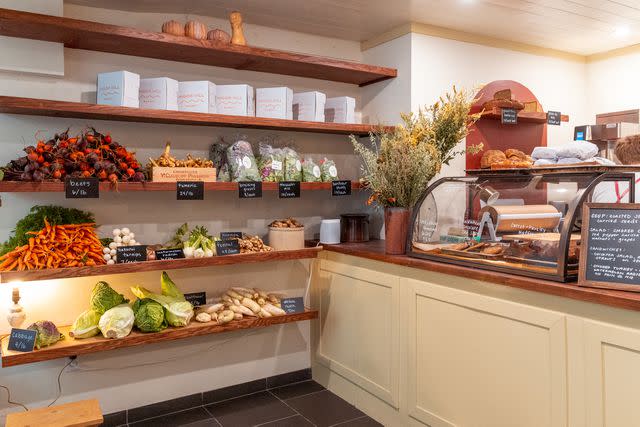How Getting Fired Fueled This Chef’s Career
- Oops!Something went wrong.Please try again later.
Chef Austin Johnson shares his unexpected journey to success, from two firings to one Michelin star at One White Street.

Matt Taylor-Gross
On a Tuesday in Tribeca, you can be charmed by a fresh, vibrant farm stand surrounding what looks like a townhome on an idyllic corner at One White Street. The building was a family-of-four’s townhome before Austin Johnson converted it into the kind of versatile concept many chefs only dream about: a restaurant with a proprietary farm growing its ingredients. Just weeks after One White Street earned its first Michelin star, it’s hard to imagine that this vision only came to life because Johnson was fired from one of the world’s most famous restaurants — twice.
Fourteen months after opening, the chef stocks his farm stand and greets neighbors and their dogs, alongside his own French bulldog, Dion. “I say hi to probably close to 100 people a day. I kiss probably 40 dogs, high five 20 babies. I make 40 reservations a day on the sidewalk. I feel like I live in a small town. It’s not this bustling chaos; it’s very quiet and quaint,” Johnson says, sitting in the restaurant's third-floor dining room.
“I remember walking through this space in 2018 and being the only one who could fully visualize the concept," he recalls. "And I spent three and a half years living that anxiety because I didn’t know if this restaurant would feel good or look good until we put the tables and chairs in. I didn’t know how small it was going to be or how functional.”

Ashley Day
One White Street is intimate in the best way, with sandwiches and soup during the day (now at Rigor Hill Market that just opened next door), a wine bar featuring the a la carte menu on the first floor and patio, and the seven-course tasting menu served on the second and third floors.
Johnson started cooking at age 14 and made his way to Canlis in Seattle, one of Food & Wine’s 40 most important restaurants of the past 40 years. From there, the Nebraska native cooked on a fishing vessel in Alaska for 11 weeks to earn enough money to move to New York City, which was a place he'd never actually visited. In 2010, he drove from Seattle to New York, staged at Eleven Madison Park that night, and started full time the next day.
After 11 months at EMP, Johnson had the opportunity to return to the fishing vessel to make the money he needed to stay in New York — something that was untenable on his $9 an hour salary. He presented the idea to then-chef de cuisine Abram Bissell, promising to pick up where he left off after the three-month hiatus, but chef and owner Daniel Humm pulled Johnson aside in the walk-in fridge to question whether he wanted to be a chef or a commercial fisherman. "That was the first time Daniel Humm fired me," he says.
:
Johnson had fun on the boat. A lot of fun. He used his earnings to stage at multi-Michelin-starred European restaurants (Noma, Oud Sluis) but Bissell was beckoning him back to New York to join the opening team at The NoMad. “I was like I’m pretty sure Daniel Humm’s kind of pissed off at me,” Johnson says, but he returned to EMP, and the chef-owner commended Johnson’s decision to see more of the culinary world and welcomed him back as opening sous chef. He stayed there for three and a half years, working with Bissell, Humm, Will Guidara, and James Kent. "That was an incredible chapter in my life,” Johnson says. “I was very influential on the cuisine in that restaurant. I was big into the R&D; it was just great.”
As with all jobs, it eventually came time to consider moving on. “I thought I’m ready to at least run a kitchen or be a chef de cuisine,” Johnson says. “I found this really incredible job opportunity in Upstate New York in the Finger Lakes. I was taking over this 115-year-old restaurant that just had an $8 million renovation. It was one of the most beautiful places I’d ever seen, ever – the town, the restaurant – and it was a dream job. We did three dinners a week, closed four nights a week. I was allowed to hire people from all over the country, create my own tasting menus, it was wild. So I basically said yes to that job while I was working at The NoMad.”
Two issues ensued: Johnson’s decision was published in the press before he could give his notice personally, and internally, he was accused of trying to poach a colleague. Johnson says he was essentially told, “It’s been a great run, get out.”
He got the announcement article taken down, but it was too late. And the false accusation appeared to be a personal vendetta or sabotage. “It was bizarre. It was this back-stabbing scenario that really affected my career — at least in the moment, I thought my life was over. I didn’t have the full support of Daniel Humm, leaving him. That was just a tough pill to swallow.”
:
Johnson went on to run the kitchen at The Krebs in Skaneateles, New York, for three years and then moved to France where he was introduced to the ingredients that inspired One White Street and the investors who funded it.
“In France, working with that product is just supreme. Their vegetables, their meat, their game, their poultry, it’s just an unbelievable country to work in. Chefs say it’s all about the product — and you can get nice product — but that phrase came true to me in France," Johnson says. For the first 15 years he'd been cooking in the States, he was pulling brussels sprouts out of a plastic bag, but in France they were on a stalk, "And that’s everything, like figs still warm from the sun oozing sap from the top.”
Johnson returned with his plan for a restaurant — as well as a sky-high bar for produce — and his investors had land available upstate.
:
“We hired the best people to build the farm,” he says. “We hired Elliot Coleman from Four Seasons Farm in Maine to build it, consult on the project, make sure we nailed it, and now you see everything that they grow out there.” That's not limited to the produce on his farm stand out front or in the dishes he serves.

Matt Taylor-Gross
“Networking professionally now to me is truly building this community,” Johnson says. “This is a neighborhood restaurant. Eleven Madison Park is a restaurant built on international tourism. This is a restaurant built for all of the people standing outside who live down here. I’ve never experienced anything like it.”
Having a neighborhood restaurant, a farm, and a Michelin star is a trifecta;. Johnson earned recognition for a true sense of place while cultivating the community supporting it.
“This restaurant only exists in New York – conceptually, financially, business model-wise. It’s just a New York City restaurant. New York is a real place to dream of something very big.”
:
Now he’s empowering his own team to follow their dreams, with David Israelow as executive sous chef, Grayson Claes as pastry sous chef, three sous chefs, and externs from the Culinary Institute of America and the Institute of Culinary Education. “Here, you’re going to learn how to cook – fast,” Johnson says. “I don’t have a position here where you pick herbs all day or where you decide which pepper is more beautiful for five hours. You come here to learn how to really cook."
Part of the fun for Johnson is thinking for himself on the plate and expressing his own style, which he considers fun dining rather than fine dining. Five of the seven courses offer a vegetarian option that’s as thought out and inspired as the fish, meat, and foie gras alternatives. The chef celebrates the reality that many diners share and can actually enjoy 12 courses together, and he prides himself on original ideas that he developed throughout the pandemic and the three years it took to convert a landmarked residential building into the inviting restaurant he runs today.
“This restaurant should not have ever been built. I can go on my phone and look at when this used to be a bedroom. I’m very proud of seeing that vision through, this team, the people we’ve cultivated, the energy and culture we have, this bread baking program,” Johnson says. "I’m proud that we have a place like this to do it.”

Matt Taylor-Gross
Rigor Hill Market produce next door to One White StreetJohnson imagines he’d still be at EMP today if he hadn’t been let go, and while he recommends that young cooks say "Oui, chef!" for 10 years so they can ultimately work wherever they desire, he doesn’t regret getting fired, and he and Humm have long since reconciled.
“That was the best day of my life in a way," Johnson believes. "It’s very easy to get sucked into that world of living as a sous chef or R&D chef or a chef de cuisine, or always working for somebody – which is fine. Not a lot of chefs are super creative or super business-minded or culture builders or leaders, but I felt like I had all those qualities, and I wanted to see the world. When I was in France I met the people to make this happen, and now I shake Daniel Humm’s hand on the Michelin star stage.”

